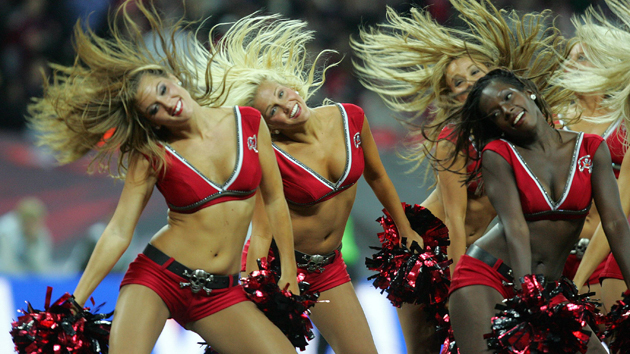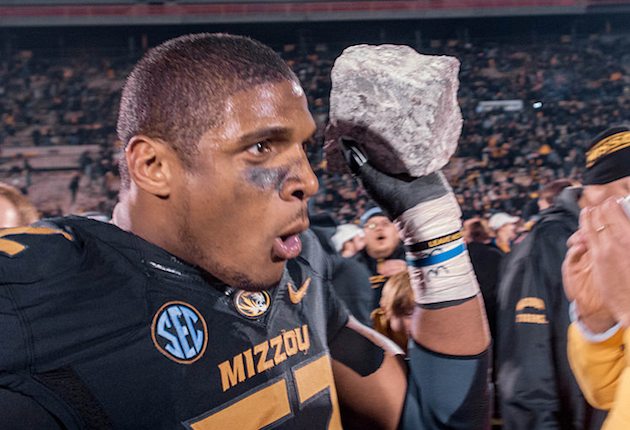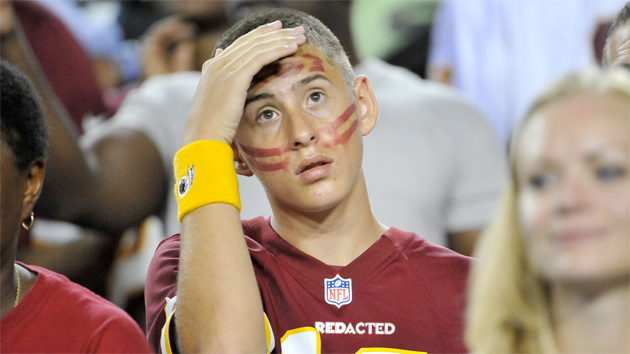
Cheerleaders for the Tampa Bay Buccaneers perform during a game.Imago/ZUMA
NFL cheerleaders might appear to be a happy, peppy bunch, but off the sidelines their working conditions are far from cheery. On Monday, a former cheerleader for the Tampa Bay Buccaneers sued the team, claiming she was paid less than $2 per hour during her 2012-13 season of work. It was the fifth such lawsuit this year; cheerleaders for the Oakland Raiders (Raiderettes), the Cincinnati Bengals (Ben-Gals), the New York Jets (Flight Crew), and the Buffalo Bills (Jills) have filed similar suits. (In March, the Department of Labor ruled that the Raiderettes didn’t qualify for minimum-wage laws because they’re “seasonal workers.”)
So what’s it like to professionally cheer for America’s favorite sport? The allegations and evidence provided in the five lawsuits, plus a leaked 2009 employee manual from a Ravens cheerleader, give us a glimpse into the life of the women dancing on NFL sidelines. Here are 11 things they have to deal with:
Long game days, with little or no pay: NFL cheerleaders are often paid a flat rate for games that translates to a few bucks an hour, at best. Between arriving before the game and staying after it, cheerleaders work up to nine hours on game days. The Ben-Gals are paid $90 per game, and the cheerleaders for the Baltimore Ravens and Tampa Bay Buccaneers make $100 per game. The Raiderettes and the Jets Flight Crew make slightly more: $125 and $150 per game, respectively. The Buffalo Jills, whose operations were suspended in April after five Jills sued the team, seem to get the stingiest deal—they aren’t paid for games at all. Instead, they receive a game ticket (worth $90) and parking pass (worth $25) for each home game, which they can sell if they choose.
Not getting paid to practice: A lot of practice goes into that perfect halftime show, but many squads—including the Ben-Gals, Jills, Raiderettes, Flight Crew, and Buccaneers cheerleaders—are not paid for practicing. Cheerleaders for these teams are required to practice between 6 and 15 hours per week.
Making public appearances for free: The real money for cheerleaders often lies in public appearances at community or corporate events—Ravens cheerleaders can make about $50 per hour for corporate events. But they’re also required to attend charity events twice a month, sometimes for free. The Ben-Gals, Raiderettes, Jills, and Buccaneers cheerleaders have similar setups. Between practice, games, and unpaid events, Jills allege that they work about 20 hours a week for free.
Being auctioned off and sitting on the lap of the highest bidder: The Jills lawsuit detailed a number of public appearances involving “demeaning and degrading treatment,” including the Jills Annual Golf Tournament. First, golfers dunk bikini-clad cheerleaders into a pool of water. The cheerleaders are then “auctioned off” and ride around in a golf cart for the rest of the event with the winning bidder. Because there’s not enough room in the golf cart, Jills often sit on the bidders’ laps. Jills aren’t paid for the event.
Being fined for bringing the wrong pom-poms: Adding insult to already puny wages, some teams fine heavily for minor infractions. If a Raiderettes cheerleader forgets to bring the right pom-poms to practice, she’s fined $10. The same thing happens if she wears the wrong workout gear to a rehearsal, she forgets to bring a yoga mat to practice, or her boots aren’t cleaned and polished for game day. When one Raiderette accidentally got a Sharpie stain on her top at a calendar signing, she was required to buy a new one.
Buying dozens of copies of the calendars they posed for: Several teams produce swimsuit calendars featuring their cheerleaders. Instead of paying them for the photo shoots, some teams make cheerleaders pay for the calendars and sell them on the side. The Ravens cheerleaders are required to buy at least 100 calendars at $12 a pop—installment plans are available—and then sell them for $15 apiece. They get to keep the earnings, but if they don’t sell their share, they’re stuck with the debt and a whole lot of calendars.
Passing the “jiggle test”: It’s no secret that cheerleaders have to be in good shape, but turns out that being eye candy for the millions of football fans also means being subject to body-policing off the field. Coming in overweight can mean being benched for a game—which effectively means losing about an eighth of your income from games—or being dismissed from the team altogether.
Different teams have different weight-judging strategies. The Jills allege being subjected to a weekly “jiggle test,” which consisted of doing jumping jacks while their stomachs, arms, legs, hips, and butts were scrutinized. (The Jills manual also instructs, “Never eat in uniform unless arrangements have been made in advance. Just say ‘Thanks so much for offering but no thank you’…NEVER say, ‘Oh, we’re not allowed to eat!'”) Ben-Gals are required to weigh in twice a week, and if they come in more than three pounds over their “goal weight,” they face penalties: extra conditioning after practice, benchings, probation, or dismissal from the team.
Trips to the salon on your own dime: Being thin and toned is only the tip of the beauty-standard iceberg. Cheerleaders are expected to wear their hair and makeup in very specific ways, but often aren’t reimbursed for the cosmetic products and salon visits it takes to follow the rules. (Check out the Jills beauty and etiquette manual below for specifics.) The Ravens demand that the girls stay tan, keep their nails manicured but not too flashy, and get their hair dyed at least two weeks prior to every game. The Jills buy their own uniforms for $650 apiece, and while in uniform, are required to wear “foundation, blush, three natural eye shadow colors (lid cover, highlighter, definer), eye liner, mascara and red lipstick.”
All this grooming gets pricey—one former Ravens cheerleader says that keeping up her hair and makeup could cost more than $1,000 per season. A member of the Jets Flight Crew alleges that the team “required her to wear her hair straight, which in turn required her to see a hair stylist each week at an approximate cost of $45 per styling.” The Raiderettes handbook, according to an ESPN the Magazine article, simply says that it’s possible to “find yourself with no salary at all at the end of the season.”
Being instructed on how to use a tampon: Jills are given a manual that covers “appearance etiquette” and “etiquette for formal dining.” The guidelines are impressively detailed; for example: “If you are served pasta, never cut it to eat. Twirl a small portion on your fork with the assistance of a spoon.” Jills are instructed how often to brush their teeth and wash their faces (“Make-up left in the creases of your skin creates early wrinkles”). The manual even tackles what it calls “lady body maintenance.” “A tampon too big can irritate and develop fungus,” it reminds cheerleaders. “Products should be changed at least every 4 hrs.”
The full manual (first obtained by Deadspin):
While we’re on the subject of lady parts, the Ben-Gals handbook (read the full version here) stipulates that “no panties are to be worn under practice clothes or uniform, not even thong panties.”
The Raven cheerleaders’ social-media presence is subject to a similar amount of micromanaging. According to the 2009 employee handbook, “If you participate in any social networking sites, such as MySpace or Facebook you are required to ‘Friend Request’ your director.”
Keeping these policies under wraps: It may be impolite to discuss money, but many cheerleaders are explicitly barred from talking about their income and their squad’s fee policy. The Jills handbook instructs: “NEVER discuss income!” The Ravens cheerleaders and the Raiderettes are also told to hold their tongues about the public appearances they’re required to make.
And doing it all with a smile: In their etiquette manual, Jills are instructed: “Do not be overly opinionated about anything…Be positive and consistently optimistic about everything…Never complain!” Ben-Gals are required to follow rules guiding their “attitude and behavior,” as follows (emphasis theirs): “Insubordination- Webster defines this word as ‘not submitting to authority; disobedient.’ Syn. Rebellious, mutinous, defiant. Insubordination to even the slightest degree IS ABSOLUTELY NOT TOLERATED!!! You will be benched or dismissed!!!” ; “Authority- ABSOLUTELY NO ARGUING OR QUESTIONING THE PERSON IN AUTHORITY!!!”
Looks like NFL teams might be out of luck on that last one.


















